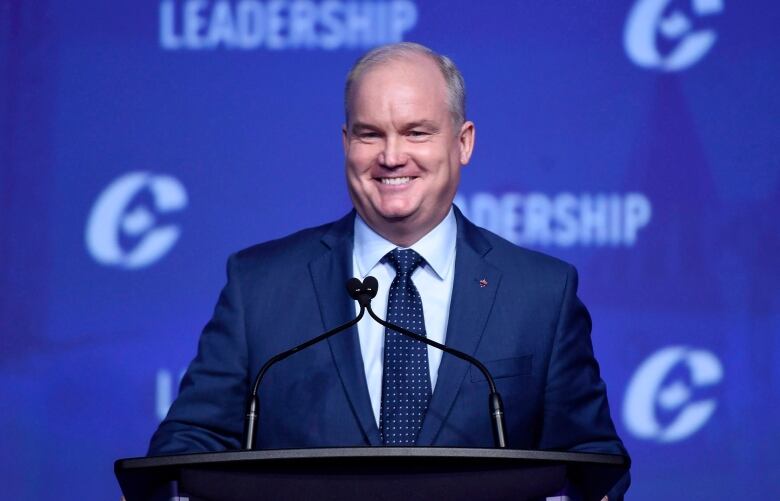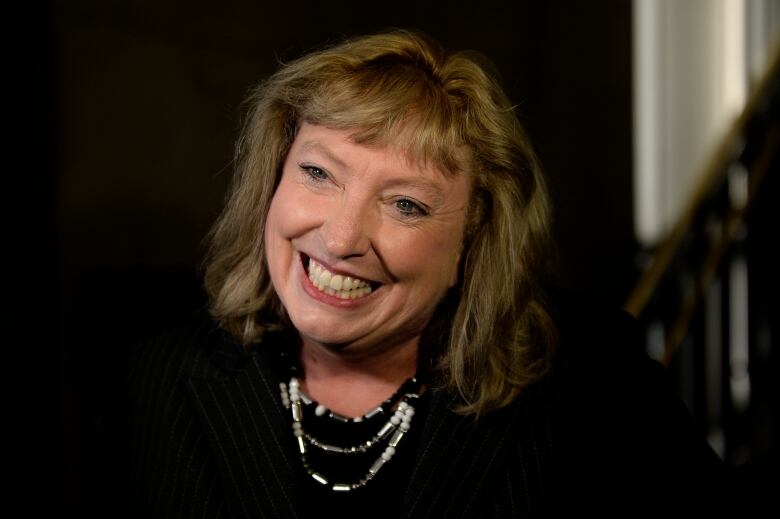Conservative voters like Peter MacKay. Does that mean party members will, too?
Polls of party supporters give Peter MacKay a big edge over his Conservative leadership rivals

A recent poll suggests that Peter MacKay is the overwhelming favourite in the Conservative leadership race among Conservative voters, with more than 10 times the support of Ontario MP Erin O'Toole, his closest competitor among those who are officially in the running.
But party members, not voters,will decide who gets to win. So, do the numbers mean anything?
Conducted by Lger for the Journal de Montral, the survey polled 1,501 Canadians and found that 42 per cent of the 402 Conservative voters interviewed think MacKay would be the best person to lead their party.
The former cabinet minister was followed, at length, by Alberta MP Michelle Rempel Garner (who says she is still thinking about a bid) at six per cent, O'Toole at four per cent, Ontario MP Marilyn Gladu at two per cent and potential social conservative candidate Richard Dcarie at one per cent.
That's an enormous 36-point lead for MacKay over the rest of the field. He had 76 per cent support among those who listed a preference.
But these numbers take into account all respondents who said they intend to vote for the Conservatives. In the 2019 federal election, there were nearly 6.2 million Canadians who cast a ballot for the party.
In the last leadership race held in 2017, however,just 141,000 party members voted. Those are the people whose opinions counted.
The Lger poll provides an interesting glimpse at what the Conservative voting base thinks of the leadership contenders, but the numbers don't say much about what the outcome will actually be.
But that doesn't mean the results are completely meaningless and it doesn't mean the O'Toole or Gladu campaigns can shrug the numbers off entirely.
Clear front-runners tend to win
It's an understatement to say that leadership polling of party supporters is a blunt instrument. In 11 federal and provincial leadership races held over the last two decades for which polling data is available (and where all members had a vote), the average difference between the final polls and the actual results was 8.3 percentage points per candidate.
And that's just the average. There are cases of discrepancies in the double digits, or even more than 20 points.
That's no fault of the polls, of course. They are sampling an entirely different population than the one that casts a ballot in leadership races. Instead, it is a stark reminder that supporters and members can often see things very differently.
But not always.

The batting average of leadership contestants who placed first inpolls of party supporters is mixed little better than .500. But in the cases in which the polling front-runner failed to win, their polling lead was an average of just 11 points. In cases where the front-runner did end up winning, their polling lead was an average of 37.5 points. In other words, the closer races had more unexpected results than the apparent cakewalks.
This is where things get dicey for O'Toole and Gladu. MacKay's lead looks similar to the ones posted by Justin Trudeau in the 2013 Liberal leadership race or Pierre Karl Pladeau in the 2015 Parti Qubcois leadership. They utterly dominated the field in polls of party supporters and comfortably won with a majority of ballots cast in the first round of voting.
Don't you know who I am?
Name recognition plays a big role in this kind of leadership polling. Trudeau, the son of a former prime minister, was a household name in 2013. Ditto for Pladeau, head of a hugely influential media conglomerate in Quebec.
MacKay is not nearly as well known, but he is far more familiar to Conservative voters than his rivals.
A recent Ipsos poll for Global News found that only 42 per cent of Conservative supportersdid not know enough about MacKay to have "an informed opinion." That compares very favourably to O'Toole's 75 per cent, Gladu's 80 per cent and 85 per cent for Derek Sloan, another Ontario MP who has declared his intention to run.
That should lessen the importance of MacKay's advantage among Conservative voters. Most people just don't know who the other candidates are.

But that should be worrying news for O'Toolein particular. Sloan is a first-term MP and Gladu is only beginning her second term on the opposition benches.
But O'Toole has been an MP since 2012, sat in Stephen Harper's cabinet and placed third in the 2017 Conservative leadership race. His name recognition should probably be a bit higherparticularly among the people most likely to be familiar with the Conservative caucus.
And MacKay has more going for him than just name recognition, with 47 per cent of Conservative voters telling Ipsos they have a favourable view of him compared to just 11 per cent with an unfavourable view. That's a net +36 favourability rating much better than O'Toole's +1, Sloan's -1 or Gladu's -2.
It's certainly possible that Conservative party members see the field very differently. It's perhaps unlikelythat MacKaywillwin by such an enormous margin when the votes are finally counted in June.
But MacKay already has more of the Conservative caucus lining up behind him 22 MPs and senators as of Wednesday afternoon, againsttwo for O'Toole and none for anyone else and quickly raised the party's $300,000 entry fee.
So, it's not the latest polls that necessarily make MacKay the clear front-runner. But they certainly do add another strongargument in his favour.













_(720p).jpg)


 OFFICIAL HD MUSIC VIDEO.jpg)
.jpg)



























































































